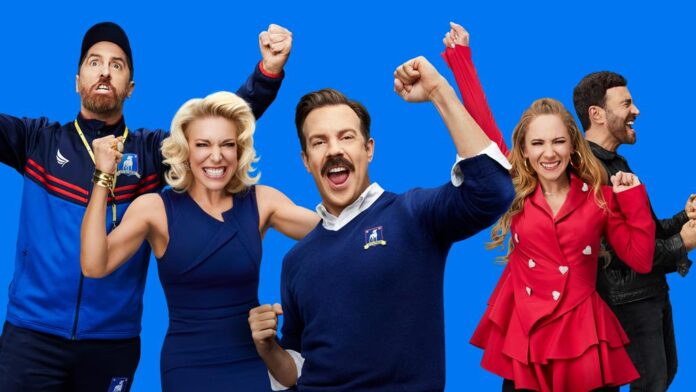Ted Lasso was always an anomaly. When the show snuck into an already crowded streaming market in August 2020, the initial reactions — like the titular character himself — were overwhelmingly positive. Jason Sudeikis’ portrayal of the fish-out-of-water head coach transplanted from the collegiate gridiron of Kansas to the English Premier League pitch was a joke — seriously. The concept that began as a comedic bit of advertising for NBC Sports a decade ago has managed to rack-up 40 Emmy nominations through its first two seasons. It’s now 2023 and Ted Lasso has just aired the final episode of its third (and possibly last) season on Apple TV+, and I’m honestly not sure I’ll ever be quite the same as I was three years ago because of it.
Ted did to me just what he did to the fictional world he inhabited — he thoroughly charmed and inspired me. By the end of the first episode, I was intrigued. By the end of the second, I was hooked. Such is the power of Ted Lasso. Slowly but surely, the very same unrelenting optimism and forthrightness that has fractured his marriage for being “too much,” begins to thaw the cold reception he receives in England. The characters in Ted Lasso are naive, conceited, vengeful, duplicitous, meek, and cynical. He meets them with kindness, respect, empathy, and forgiveness. He is a man fully consumed with grief, and yet he is a beacon of outward compassion and stoic grace. He treats the people around him as if they will inevitably do the right thing, and he does it so consistently that they eventually live up to it.
The show itself abandons cynicism. Eventually, the characters do what you hope they’ll do, and are rewarded for it. Where other, more typical shows would punish acts of misplaced trust or gullible characters who just don’t understand “the real world,” Lasso awards them. That’s what was so refreshing about the show in season one: ultimately, everyone is rewarded for mutual trust — characters and audience alike. Things don’t always work out, of course, but the “big” losses (like the club’s relegation) feel like opportunities for growth, whereas a simple game of darts in the local pub is imbued with its own sort of gravity.
The core of this dynamic is Lasso himself. Behind the folksy charm and twangy drawl is a keen observer of human nature. His disarmingly congenial hayseed persona rarely reveals the depth of his thoughts. His ethic as a coach: “helping these young fellas be the best versions of themselves on and off the field,” is embodied by the way he manages his team. The culture he fosters in the locker room creates a space for healthy, supportive masculinity. Slowly but surely, everyone in Ted’s orbit begins to embody his idealism, becoming more virtuous, balanced individuals, and paying that forward into the world.
However, both Ted and the show are victims of their own success. The more mature and principled the characters become, the less conflict there is to address. By season three, the story feels wayward, following the exploits of the team as they put Ted’s teachings into practice outside of the club. Emotionally matured, the supporting characters can now address their deep-seated internal struggles, like Rebecca’s (Hannah Waddingham) feelings of scorn; Jamie’s (Phil Dunster) daddy issues; and Roy’s (Brett Goldstein) inadequate self-esteem. These deficiencies have been persistent obstacles to growth and self-realization, and in no one is this more apparent than Nick Mohammed’s Nate “the Great” Shelley.
Nate’s dark turn at the end of season two was unnerving and focused a spotlight on toxic positivity, but early in season three his redemption is all but certain. The characters in Ted Lasso are broken, but with love, support, and understanding, they can mend. The more that Richmond FC comes to internalize Ted’s morality, and the better equipped they are to navigate their own crises, the more Ted is relegated to the background. Bereft of that paternal responsibility, Ted grows increasingly despondent. It’s a weird vibe, but it does pay off — eventually.
Ultimately, the third season wasn’t as funny, focused, or polished as the first two. If the show really does consciously evoke Star Wars in its structure, then the team’s Sound of Music performance is definitely an example of where the show gets a little too “muppety” for its own good. But it’s a lot to ask a show of this caliber to repeatedly clear a bar it initially set so high for itself, and yet it still occasionally manages it. It’s a truly excellent show, with the trophies to prove it, and yet I can’t shake the feeling that its true legacy is the impact it leaves on its audience. Coach Lasso didn’t just shape his players… he shaped me too. It made me hyper-aware of the way I moved through the world, and conscientious of my interaction with colleagues and strangers alike. It made me want to be a better version of myself — on and off the field. Ted Lasso is a hopeful show in an increasingly cynical world, and there’s no amount of Emmys that can adequately reward that.
Long ago, when DeLoreans roamed the earth, Brad was born. In accordance with the times, he was raised in the wild every afternoon and weekend until dusk, never becoming so feral that he neglected to rewind his VHS rentals. His historical focus has assured him that civilization peaked with The Simpsons in the mid 90s. When not disappointing his parents, Brad spends his time with his dogs, regretting he didn’t learn typing in high school.



